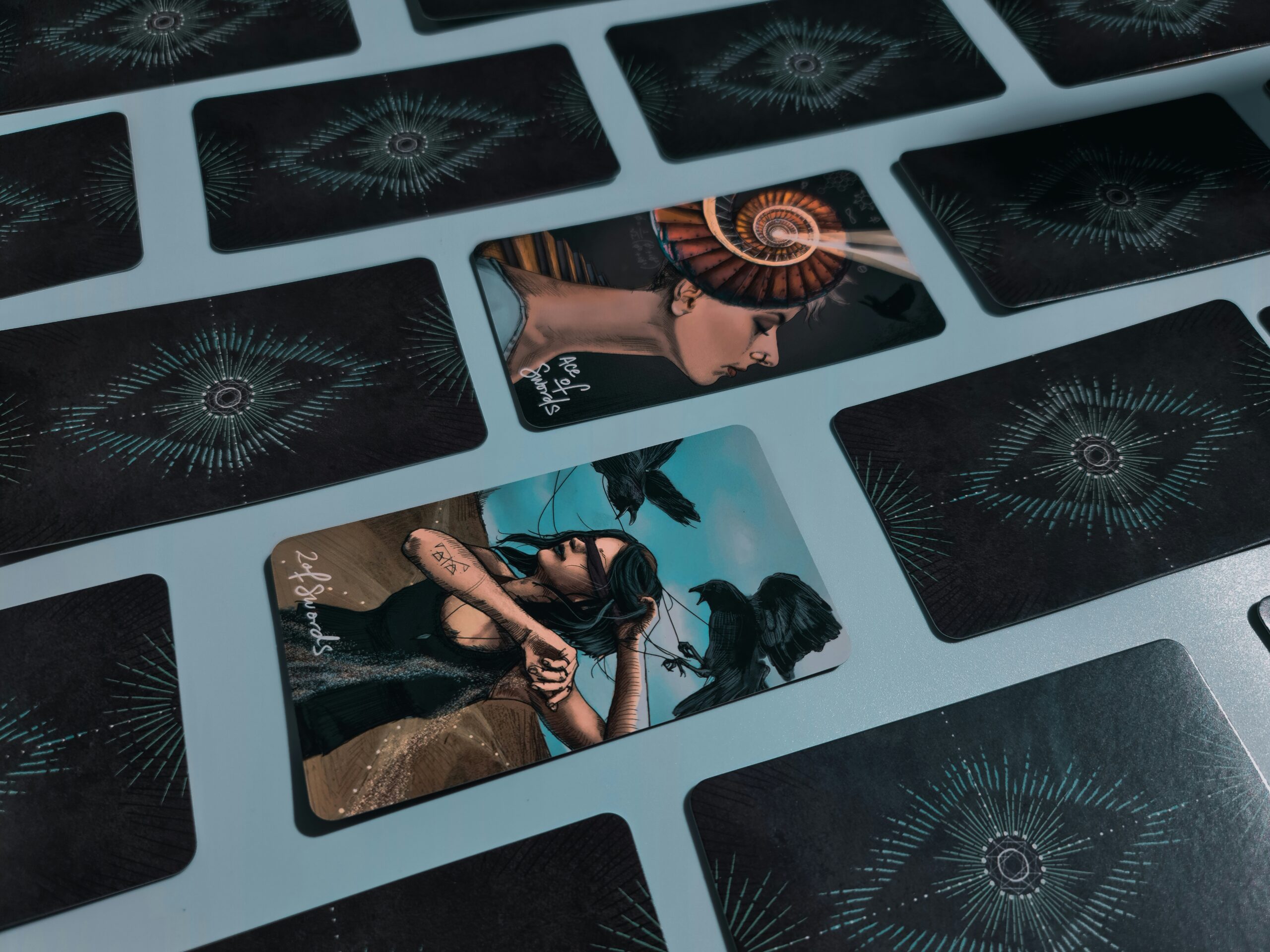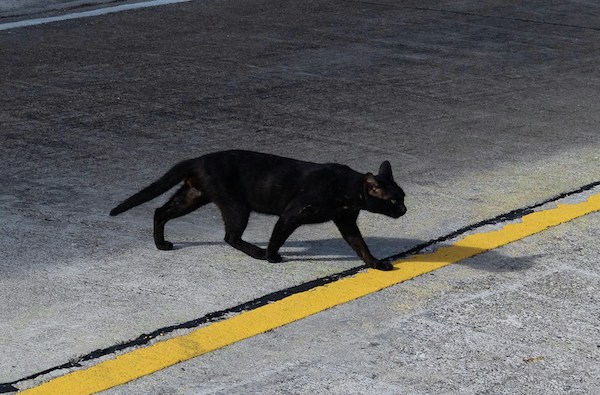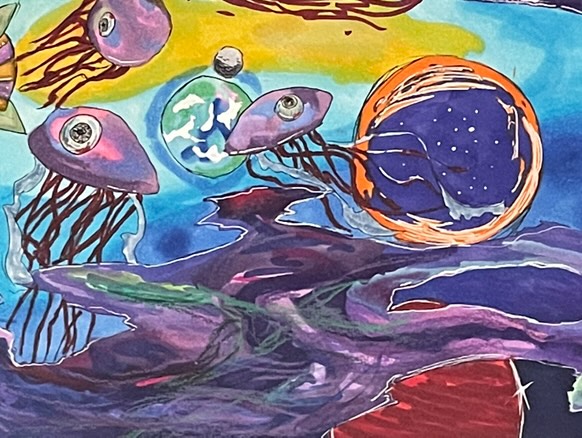Journal
Articles

The other side
Metamorphosis is violent, and isn’t this radically beautiful to transform this body, to shape and alter it, to decay in order to live? To die in order to flourish? I can’t tell you how excited I am to expand. To walk in every direction of this life. Shoulders back and chest stretched wide in sunshine. No longer hunched and hiding. But full bodied and glorious. I hope I’ll be more sure, that I’ll speak more from the chest, that I’ll be more honest, when there’s less to hide behind. My future has never felt so bright.

Imperceptible signs
One day, I took a necklace with a hollow silver heart from my jewellery box. I gave it to my sister, telling her that this was a special necklace. Whenever she wore it, she would be protected from ghosts. She wouldn’t be able to see them anymore. She wore the necklace constantly and for the next week or so she slept peacefully through the night. But soon after the ghost returned. She would now appear in the hallway and this time she had a man with her. And so it continued.

Ourself behind ourself
There are moments in my life I look back upon in awe and disbelief. Other times, new consciousness allows me to view dimly lit tracts previously incomprehensible and menacing with luminous epiphany. It seems to me that in those moments another woman or girl was acting in my place, withholding my motivations, protecting me from being an accomplice. This shadow actor, the extent of whose influence I am never fully aware, sometimes passes through my peripheral vision, filling me with unease. What ambush might she stage if I do not keep watch? What confession might she murmur while I am asleep?

Spectres of place
In September 1992, bushwalkers carrying out an orienteering activity in Belanglo discovered the remains of two mutilated female corpses covered in leaf litter. This led to a police investigation that was unsuccessful. When the investigation was closed leaving the victims still unidentified, Bruce began spending some of his time in the forest looking for evidence that might help solve the mystery. He knew the forest well from collecting firewood there to fuel his kiln and had an extensive collection of maps showing the fire and walking trails that covered the whole area.

Inside the dark tower
Thinking of what is gone, I pause on the bridge and look back. The windows and sleek curvature of Woodside Karlak now give the impression of smooth scales, sliding upwards towards the encroaching night. It is hard not to appreciate elements of the architecture, even when you know what is being sacrificed as a consequence of the decisions that take place behind the darkened glass of the great tower.

A discovery of witches
Unlike the patriarchal and monotheistic Abrahamic religions, paganism is structurally non-hierarchical – although covens (groups or meetings of witches) tend to be nominally led by a high priestess and high priest – and, in the words of influential English Wiccan Vivianne Crowley, pagans ‘worship the personification of the female and male principles, the Goddess and the God, recognising that all forms of the Goddess are aspects of the one Goddess and all Gods are aspects of the one God’. There is no holy book, messiah or central administration, and its ethos is fundamentally exultant – celebratory of the body, nature and the divine.
To clarify a common misconception: most pagans neither believe in nor worship Satan, a figure rooted in Judeo-Christian traditions rather than nature-based spiritual paths. The conflation of pagans with ‘devil-worshippers’ dates to the twelfth century and is a product of the Catholic Church’s campaign to quite literally demonise the horned, cloven-hoofed gods – Pan, Herne, Cernunnos and others – central to the pre-Christian spiritualities the Church was intent on suppressing.
The witch trials of the early modern period, where accusations of devil worship were frequently levelled against those, usually women, who practised folk magic, herbalism or traditional healing (or, in many cases, had simply drawn the ire of a relative or neighbour), reinforced the association between nature-based religion and Satanism. As the historian Ronald Hutton observes in The Witch: A History of Fear, from Ancient Times to the Present (2017),the standard scholarly definition of ‘witch’ has come to denote, in the words of anthropologist Rodney Needham, ‘someone who causes harm to others by mystical means’.

Meatspace
IN THE EARLY stages of a relationship, I suppose there’s always a tension between how much to withhold and how much to disclose. An incremental filling in of history. I was in the unusual position of only having so much control over this process, namely because I’d published an account of my long history of mental illness, its contents accessible to anyone who knew my name. Laid out in granular detail: an account of my self-destructive compulsions; my regular descent into trance-like episodes that could keep me captive for hours on end; my capacity to keep secrets; my many-sided shame. All my monsters, so to speak, there on the page.
The whole idea of dating terrified me in part because of what my body, on closer inspection, revealed about me. You didn’t need to be that far along into getting to know someone before they held your hand, or stroked your hair, but I found both of these prospects terrifying. My fingernails were mutilated; my hair was meticulously arranged to hide the fact I’d torn most of it out.
How to begin to explain what I’d done?

Agony aunty
Michelle always stank of stale cigarettes because back then you could smoke inside the casino. She always looked tired and her skin was almost translucent from being indoors all night and sleeping most days, but I thought she was glamourous. Vampiric, even.
I was never properly introduced to her. I was only told to call her aunty, that she was a friend of my mother’s and to do what she said.

Maiden, mother, monster
My son worries that a monster will come at night. This is a new concern of his, and I try not to connect it to his father’s absence. As I tuck him in, I tell him not to worry because the truth is monsters are very scared of mothers and won’t come anywhere near me. I’m too terrifying, I tell him, making him laugh. And cats too, I add, as ours curls at the foot of the bed, watching us. My son closes his eyes.

Grave years and the undead woman
MANY A MOTHER has found herself at the mercy of this false opposition between her needs (which are cast as selfish wants) and the countless supposed needs of her child. And whenever she falls short – gives in to anger or frustration or impatience, or the more convenient but ‘wrong’ way of doing things – she undergoes a transformation: Lucy Westenra, but yet how changed. Her fangs protrude, her nails lengthen. Clutched to her breast is a child she is harming, a child not rightfully hers.

Instructions for killing monsters
I do know this: Never in the history of the world has any monster been defeated with fear. (Literally, never. I checked.) Ultimately, the only shields against the powers of destruction, death and evil are the qualities that come under the banner of love, which is the bright day to fear’s night.

The outsider
This series of mine features two traveling companions in fantastical landscapes, on the way to somewhere. The intention, destination and origin of their excursion are deliberately undisclosed and left to interpretation. I was drawn to depictions of the horse and cat specifically for their status and history as companion animals. I was also interested in the literary tradition of using these specific animals as placeholders and repositories for human characteristics, the horse often being loyal, determined and heroic and the cat often being independent and uniquely intelligent but prone to caution. For me these paintings are about the journey and what is required to undertake such a feat.